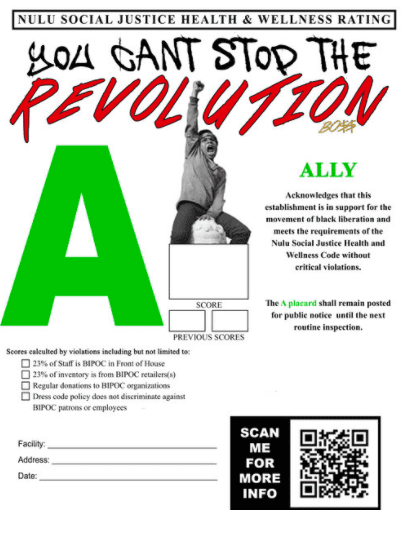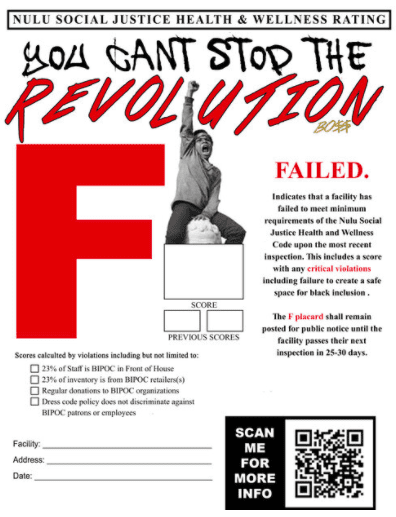BO$$ Racial Shakedown In Louisville

In Louisville, Kentucky, a black social justice organization with the rather unsubtle name of BO$$ is threatening businesses in the NuLu district with public denunciation if they don’t conform to its demands, including making donations to black organizations. If you want to get a passing rating from these thugs, this is what you have to do:

“Social Justice Health and Wellness Code” = a social credit system for small businesses. If you don’t comply, this is what you get:

You can see a complete list of the demands these grifting bullies presented to the small business owners here. They accuse these shopkeepers and restaurateurs of destroying the black community.
Some local business people are upset by this pink-terror shakedown. Excerpts:
Several protesters confronted a local restaurant operator outside his establishment Thursday after he publicly denounced a list of demands that activists have issued to dozens of businesses in NuLu, a small commercial district in downtown Louisville.
The protesters say business owners in the area have benefited from years of gentrification following the demolition of a public housing complex that displaced many Black families. And they put forth the demands during a demonstration last week, calling on the owners to employ more Black people, purchase more inventory from Black retailers and undergo diversity training.
Some owners have embraced the requests, saying they recognize the area’s history and want to make their businesses more inclusive.
But others, including restaurateur Fernando Martinez, say they take issue with how the demands were presented. Martinez dubbed them “mafia tactics” used to intimidate.
“There comes a time in life that you have to make a stand and you have to really prove your convictions and what you believe in,” Martinez wrote in a public Facebook post. “… All good people need to denounce this. How can you justified (sic) injustice with more injustice?”
Martinez is a Cuban immigrant. Not all NuLu business owners agree with him:
Lauren Justice, co-owner of Nouvelle Bar & Bottle, said she and other NuLu business owners have “a responsibility to admit” that gentrification occurred and to actively participate in increasing diversity in the area.
As a white business owner, she said she thinks the protesters’ demands are legitimate, and she and her business partner “humbly welcome feedback.”
“As owners of Nouvelle, we realize we could and should have been doing more and we are trying to do better,” she said by email. “… We know there’s a lot more work to be done and that a long-term commitment is what it takes to make sustainable change.”
The whole “gentrification” charge is all but impossible to defend against. The part of town known as NuLu was once poor and crime-ridden. There was a concerted effort to bring it back to life with new businesses and residential spaces — and it succeeded massively. But this effort also displaced some poor black people who lived there. Naturally, you cannot imagine that they were happy about it. The BO$$ activists are trying to extort white guilt money from the businesses there who benefited from gentrification.
Nobody ever favors “gentrification,” but most people favor it when it’s called “redevelopment.” I was once a gentrifier. In the mid-2000s, my wife and I bought a restored bungalow in Junius Heights, a “transitional” Old East Dallas neighborhood — meaning it was once a violent, run-down neighborhood, but was now gentrifying. We paid $165,000 for this three-bedroom, 1914 house. The neighborhood was not bad at all, but it was still considered somewhat risky. Let me put it to you like this: sometimes late at night, we could hear gunshots from the poor Hispanic neighborhood not too far away.
During the 1980s and into the 1990s, all those beautiful Arts and Crafts bungalows were falling apart, and the neighborhood was infested with violent crime. Our neighbors were an older working class Latino couple who had been there since the 1980s. They told us that for the longest time, they could not sit on their front porch at night because it was too dangerous, given stray gunshots from rival drug gangs. They were very happy with the gentrification, because it gave them the freedom to be outside, and to walk around the neighborhood.
We put $50,000 into improving the house — money that we lost when we had to sell the house in 2010 when we moved to Philadelphia. The real estate market in Dallas was depressed in the wake of the 2008 crash. We sold the house for exactly what we paid for it. That was our only offer.
Junius Heights took off after the economy recovered. A couple of years ago, we stumbled across our old house on a real estate website. The couple who bought it from us was selling it after owning it for only seven or eight years, an apparently doing nothing to it. The asking price was around $400,000 — which was the going rate for that neighborhood then. On a subsequent trip to Dallas, we drove through the neighborhood, and it looked as if our old Latino neighbors had sold out and moved away. Their house was not in good shape at all, but I bet they got a good price for it. Was that a good or a bad thing? I don’t know where they moved to, but as working class Latinos in a neighborhood that had suddenly become middle class and diverse, but heavily white, they probably felt out of place. On the other hand, maybe the relatively high price their home surely commanded allowed them to buy something nice in a neighborhood they preferred.
Or, maybe they didn’t want to leave, but could no longer afford the property taxes on a home that, despite its condition, was suddenly valued much more than it ever had been. Maybe they were sad to go.
The thing is, what is the alternative to gentrification? Would Dallas have been better off allowing its Arts & Crafts bungalows to fall down rather than see them purchased by middle-class, mostly white people, who had the money and the desire to restore them? Junius Heights is now an official historic district. They’re not making any more Arts & Crafts bungalows. The gentrifiers saved it. Unless you’re going to tell people that because of their race and/or their economic class, they cannot move into a neighborhood, you are going to have gentrification as a result of living in a free society. Unless you forbid people from moving out of a neighborhood when they no longer wish to live there, for whatever reason, you are going to have “white flight,” or “brown flight,” or “black flight” — this, because we live in a free society.
I don’t know anything about the NuLu neighborhood development, so I welcome correction or clarification. My analysis here is based on a general knowledge of how gentrification works. I would like to know, though, if these Louisville activists believe it would have been better for that Louisville district to remain poor and rundown, and its historic buildings left ramshackle. If they believe it would have been better to redevelop the neighborhood while making it possible for its impoverished black residents to have remained there, what would have been the mechanism for achieving that outcome? Where would the money to have renovated and kept up those old buildings have come from?
Again, in my old gentrifying Dallas neighborhood, nobody pushed out the Latino couple. They left either because they could no longer afford the property taxes, or because they received an offer for their house that was too good to pass up. And now, we Drehers couldn’t afford to buy a house there, and if we still lived there, we would be faced with a rising property tax bill too. If property values went up so much that we middle-class white people could no longer afford to pay our taxes on the place, and had to sell, would anyone feel sorry for us for having to move? Should they? Would we be victims of the evil of gentrification, or would this simply be how life goes in a free country?
When it comes to “gentrification” and related issues, this chart tells a hard political truth:

Anyway, the BO$$ shakedown in Louisville has to be resisted. God bless Fernando Martinez, who is standing up for himself and for what’s right, and who, not being an American middle-class educated white person, is not easy to intimidate by appeals to white liberal guilt. I encourage all my Louisville readers — liberals, conservatives, white, black, Latino, Asian, everybody — to patronize his restaurant, La Bodeguita de Mima, to stand with him against this woke racist mafia. All those who refuse to be bullied by bullies deserve our support — and our business.
Besides, Cuban food is delicious. Try the vaca frita.

UPDATE: News from Louisville’s El Kentubano newspaper, which has organized an event to show solidarity with the business:
The Louisville Cuban community and friends of the Louisville Cuban community will be gathering Sun. at 4pm at La Bodeguita De Mima in support of the local immigrant-owned business that has been subject to vandalism & extortion in recent days. On Fri., protesters shut E. Market. The vast majority were friendly, and Bodeguita staff gave out ice and also allowed individuals to use the restaurant’s dumpster and trash cans. Others were more hostile and presented the business with a list of demands. They told Fernando and his partners that they, “better put the letter on the door so your business is not f*cked with.”
The restaurant could not open on Fri. evening because roads were blocked. Management and staff were concerned about safety and did not open Sat. or Sun. 30+ staff members (mostly immigrants) were unable to earn a paycheck.
Co-owner Fernando Martinez, a man who escaped Cuba on a raft, spoke out against intimidation and threats on Facebook.
While most were supportive of Fernando’s comments, others were not. Orders on Facebook were given to “get him”, and a small group mobilized and came to the restaurant yesterday afternoon. More threats were made and some property was destroyed.
Fernando and his partners have always been willing to participate and are known for helping the community, but threats, extortion, and destruction will not bring people closer. They only sow more division.
I hope you can make it Sun. as community members speak out against this behavior.
If I were in Louisville, I would go to show support for this man. Someone who knows him sent to me some of the things that have been said about him and to him on social media. Here’s someone criticizing a defender of the restaurant (remember that Martinez escaped communist Cuba on a raft):

[Placeholder: I posted a social media exchange, but wasn’t clear from the person who sent it to me if that was permissible. I’ve taken it down as I double-check. Hang on…]
Subscribe for as little as $5/mo to start commenting on Rod’s blog.